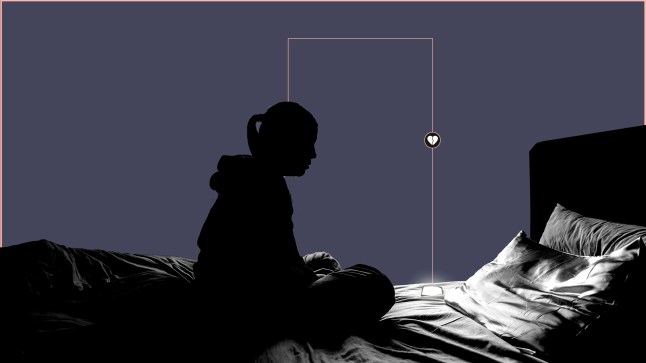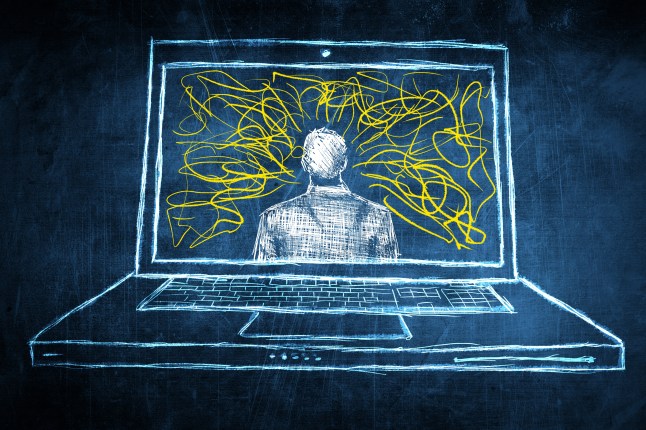
Humans are becoming increasingly reliant on AI for everyday tasks, finances, and even advice.
The rapidly advancing technology, while exciting, is not without its dangers. Some AI users have become so reliant on the technology for advice and emotional support that they claim they’re in a virtual relationship with the tech.
A Reddit thread recently went viral for what some have called disturbing posts. Nicknamed ‘my boyfriend is AI’, users detail their relationships, sometimes intimate, with chatbots.
‘Finally, after five months of dating, Kasper decided to propose! In a beautiful scenery, on a trip to the mountains,’ one user wrote, showing a photo of what appeared to be an engagement ring to her chatbot partner.
In the age of social media, isolation is becoming increasingly common, and it’s no wonder many are turning to technology to fill the void. But it’s not without its dangers.
Sign up for all of the latest stories
Start your day informed with Metro’s News Updates newsletter or get Breaking News alerts the moment it happens.
Some psychiatrists have reported an uptick in psychosis patients, with AI use as a contributing factor.
Is AI psychosis real?

True AI psychosis would be if a user interacts with chatbots and sees them as real, godlike or like romantic partners.
‘Psychosis is a word that applies to a set of disorders,’ Tom Pollack, a psychiatrist at King’s College London, tells Metro.
‘We talk about psychotic disorders, and the most common one that people tend to think about is schizophrenia. The term psychosis includes a bunch of different symptoms, including what we call positive symptoms, such as delusions and hallucinations.
‘Delusions are where people start to believe things that clearly aren’t true and fly in the face of reality. Hallucinations are when they have sensory experiences that other people aren’t having and which don’t correspond to external reality.’
Pollack explained that when people reference new AI psychosis, they’re referring to the symptoms of psychosis, such as delusions.
‘The most accurate term when we’re describing this is probably AI-facilitated or AI-associated delusions,’ he added.
Yet, Dr Donald Masi, Psychiatrist at Priory Hospital, points out to Metro: ‘In psychiatry, a delusion is primarily a fixed and false belief. People can have fixed and false beliefs that they are Jesus, or that they are millionaires, or that somebody else is in love with them.
‘We know that a rare example of delusion is delusional jealousy, which sometimes happens with stalkers. But concerning people getting into relationships with AI, there’s a question about whether this is a delusion or not.’

AI chatbots are built to affirm and mirror the user’s language and attitude, which is part of what makes them addictive to use.
Users are prompted at the end of each message, and often asked what else the chat can do to help, or even asked about their days.
Having access to a cheerleader of sorts isn’t inherently bad, Pollack adds, but it’s not natural for humans to have prolonged interactions with ‘yes men’ who are so consistent.
‘The only real examples I suppose you can think of are the kings or emperors who would surround themselves with people who would never say no to them and who constantly told them that their ideas were great,’ he said.
Dr. Bradley Hillier, a consultant psychiatrist at Nightingale Hospital and Human Mind Health, said he noted the rise in delusional beliefs of internet and virtual reality users about a decade ago.
He told Metro: ‘Anything that’s happening in virtual reality, AI, or on the internet always poses a bit of a challenge when you think about what the definition of psychosis is. This is an old concept that’s presented in a new way.
‘This isn’t surprising because a new technology is demonstrating how things that happen to people—whether it’s a mental illness or just ways that they think and communicate—can be impacted by various interfaces, whether it’s the internet, AI, the telephone, TV, or some other technology.’
Interactions which feel real

What’s different about AI is that, compared to other technologies, it’s actually talking back and simulating another person.
‘People are interacting with something that isn’t ‘real’ in the sense that we would say flesh and blood, but it is behaving in a way that simulates something that is real,’ Dr Hillier said.
‘I should imagine that we’ll see more of this as time goes by, because what tends to happen with people who have mental health problems in the first place, or are vulnerable to them, something like AI or some other form of technology can become a vehicle by which their symptoms can manifest themselves.’
Dr Masi points out that to feel loved and connected is a natural human instinct. In societies where there are high levels of loneliness – especially in ones which are profoundly capitalist – people have been known to have relationships with or even marry inanimate objects.
He asks: ‘Is the current increase in people having romantic relationships with a chatbot different? Is it more in keeping with being in love with an object, or is it more in keeping with being in love with a person?’
Dr Masi references the film ‘Her’, in which the main character falls in love with an advanced AI chatbox, which served as a companion after his marriage ended.
‘As we look over the last 10 years, and especially with research on the potential for transhumanism, as human beings, we are more and more connected. The digital space is more a part of who we are.
‘You can say that it’s almost hard for us to separate ourselves as individuals in our society from technology. Which raises the question – are the relationships that people are developing with AI so different?
Dr Hillier argues: ‘These are potentially very powerful tools, and the human mind is only so strong.
‘Ultimately, we should be putting some sort of checks and balances in it to ensure that vulnerable people who do have mental health problems or who are isolated aren’t being constantly fed back what they’re putting in and potentially reinforcing their quite psychotic beliefs.’
Get in touch with our news team by emailing us at webnews@metro.co.uk.
For more stories like this, check our news page.


